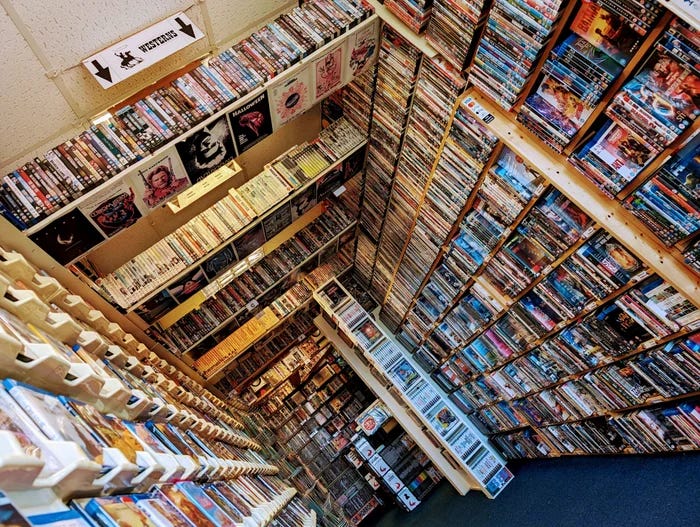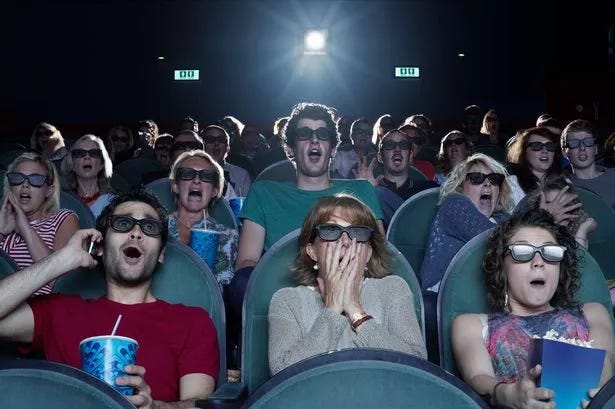Future Magic (I. Intro)
The quandary of AI imaging
(Note: this essay is the first in a series.)
(Note that these essays refer solely to AI imaging, not to the likes of ChatGPT which “answer” questions.)
AI imaging took a quantum leap around late 2022. Throughout 2023 its creations were ubiquitous and every few months got visibly better. Everyone - perhaps especially its detractors - said the weird fingers issue would be temporary, and they were proven right.
The topic of AI was discussed in several streams in Millenniyule 2023. Dangerfield pointed out that the technology would enable me to be the film director I never got to be. That, in real-time, was a moment of epiphany for me, and one that I shied away from because its implications worried me. My friend Martin Lichtmesz and I have agreed on literally every major issue since we first met in 2017, but I think this might be the one where we finally differ. If so I will also disappoint the Woodlander and the Fyrgen, and that makes me feel guilty as well.
But I am still undecided. Intellectually, I reluctantly have to admit that it makes sense for creators to use AI. But at some other level - Spiritual? Emotional? Moral? - it feels perverse. The adjustment is real and not easy, and I’m not sure whether it is right for us to make it. Maybe a younger person would not feel this dilemma. Maybe I have become fossilised. I’m in my forties; I can remember audio cassettes and VHS tapes. Maybe I am the proverbial Luddite, bemoaning new technologies simply because they are new - too new and radical for me to take in my stride. DVD, Blu-ray, HTML5, vector graphics, streaming… those were advances but they weren’t “threatening”. AI feels revolutionary, in the way the Internet did back at the start. And no doubt people in 1995 were worrying (rightly) about what it would do to libraries, to books, to attention spans… But, despite those down-sides and despite the obscene censorship we now experience on it and the unhealthy preoccupations it engenders with e-fame and social clout, one can still say that the Internet connects people and makes many things possible. Whatever its negatives, one can see the Internet as something that is fundamentally good, benign and enriching. Can the same be said of AI, whatever its positives?
In February 2024 I began seeing footage generated by OpenAI’s new “Sora” model. It forced me to accept that AI imaging is a technology one simply cannot ignore, and lofty disdain for it will not get one very far either.
Two examples that particularly stunned me were a 28-second clip following a cat at ground level as it sauntered through flowers and shrubbery, and a 60-second clip of a woman walking down a street in Tokyo. Both were entirely artificial. But for a slightly invasive sense of “over-perfection”, both were entirely life-like and convincing. I expect that, in just a few years, you simply won’t know when you are looking at AI footage. The technology has arrived into our lives almost fully-formed, a fait accompli, something that will and can only revolutionise how we do things.
I will say, as a tangent but a very necessary one, that I find AI’s close-up renditions of people disturbing and troubling. The more realistic they are, the worse it feels. I hate knowing that the person is not real at all. This illuminates something I didn’t know about myself: I have always had some kind of relationship with the person on the screen. Of course it was a completely one-way relationship, but that’s irrelevant. My feelings were never reflected back, but I never expected them to be. I don’t need payback; I just expect that I am not being tricked, that the thing which elicits real feelings in me is in some way real. It’s a person pretending, but it is a person. So, watching AI footage, it troubles and hurts me when I remember that the person is not real, doesn’t exist anywhere, has never lived, has never even been born, and never will be born. It means that no relationship is possible. It would be the empathy equivalent of a fleshlight, which hardly bears thinking about. Of course you might say that actors are always playing fictitious characters, and anyway I’ll never meet either the actor or the character, so I have always been engaging in a fake “relationship” with the person on the screen. Sure, sure… But it’s not the same, and we all know it. A rubicon is being crossed, and we all know it.
But, that rubicon will be crossed. This cannot be averted, no matter our scruples and no matter how justified they are. For good or ill, it is a certainty that the children of today will grow up assuming that anything they see - however convincing - might be artificial. They will not assume, as we have always done, that the pixels which look like a person do indeed represent a real person who either does exist, or did exist, in our real world. They simply won’t care either way. It seems bizarre to me as I write these words, but it’s inevitable. And perhaps even I, a decade or so from now, will have become the same way, and will look back with bemusement at those first forty years of my life “when pixels were people”.
I don’t assume that this will be without consequences. In every way, people are becoming ever more detached from life and less able to deal with each other. When even the “person” they see on the screen might be synthetic and therefore does not demand their empathy, perhaps they will become less able or willing to give it, even to real people? I don’t know. But either way, this new age cannot be avoided.
Another consequence is that the sheer abundance of media that we already experience will now apply to everything. We will assume that everything could have been made – probably was made – with negligible human effort, so we will take it for granted, no matter how specific, well-produced or beautiful it is. As a result, we might forget how to appreciate anything. Respect and gratitude come from appreciation of scarcity, whether of resources or ability. That scarcity is going to be eliminated by AI. Just as it severs the link between the viewer and the “people” they see on screen, it severs the link between the effort and talent of the film-makers and the reward of what they end up with.
But again, as perverse as this sounds, I don’t see how it can be avoided. It would be like asking people to painstakingly stitch together their clothes when a sewing machine is right there, waiting to be used. Even thoughtful people who understand the reasoning will not voluntarily make that sacrifice, let alone the unthinking masses.
In a way, “we are already there”. What young person today genuinely appreciates a beautiful film in the way that somebody thirty years ago did? We have become so accustomed to spectacle and high production values that it is impossible to take anything seriously. When I watch a modern film, I am probably watching millions of dollars in every scene... but I feel nothing. I have to consciously remind myself that every frame of the film stems from the efforts of hundreds of people... but because there are so many hundreds, their efforts become invisible, the magic becomes shallow, the illusion too convincing and the experience either overwhelming or too dull to care about. Either way, we disengage. Bombarded by these over-produced dramas, the thoughtful among us look for something less overbearing, less lavishly produced, more simple, more honest. And of course we only find it in the past. But it’s a past that we know we don’t belong in, so we feel like tourists, which is what all thoughtful people are in an age of garbage.
All of this begs the question of how AI will affect the dynamic between the masses and “thoughtful people”. Culture has been splintering since the arrival of the Internet (concurrent with the arrival of devices that make media production so abundant). The splintering is already at such a degree that “popular culture”, in the sense of something that everyone has read, watched or listened to, has nearly disappeared. I believe it is only the older generation (who grew up with TV) that are still keeping it going, and it will die completely with them. The response to this process from television and film companies has been to design their productions for maximal numbers of people. The results are hardly fit to be called “dramas” since they lack heart, soul and depth. There is no sincerity any more. Thus we have entered the era of “slop”, where the public (including we thoughtful ones) are confronted with massively-budgeted special effects extravaganzas that offer nothing but ridiculously high production values. Of course, this has coincided with the arrival of “wokery”, so the slop also has political preaching and moral retardation. If wokery is now subsiding as many believe, the prognosis is that we will be left with apolitical slop. The preaching might be gone, but the intellectual and moral levels, now crashed into at the bottom of the barrel thus setting a new standard, will not improve.
Again, AI imaging could resolve this situation. The more people who are involved in creating a drama – at any phase, be it the writing, the pre-production, the production or the post-production – the less sincere it will tend to be. Today these phases include focus groups, test screenings, meetings with accountants, advertisers, co-financing partners... I wouldn’t be surprised if governments (of the official or unofficial variety) become involved in the near future, as “stakeholders” in cultural production. All of this is necessary, or at least justified, by the vast amounts of money needed to make extravagant slop.
AI will allow independent people to make equally extravagant slop. That alone will change the playing field of cultural production. However, AI will also be used by “establishment” companies to drastically lower their costs. Whether made by the Disney corporation or by Derek in Leeds, a film will have been made using huge amounts of AI and its origins might be impossible to discern.
The masses will not care, as long as they get their explosions and car chases and titillation. However, the establishment companies definitely will care. Thus, I can imagine a future in which all media production is censored, controlled and licensed, in the ways currently being proposed for livestreaming and general content creation. The rationales for that non-fiction censorship - “hate speech” and “fake news” - could be replicated for fiction, though I don’t know what they would be called. This is one possible future: the authorities desperately trying to prevent the creation, or least the dissemination, of works by lone individuals.
Another possible future is that the established companies cut their losses and decide to focus solely on the masses. They can produce garbage for them at low cost using AI, so there will be less at stake for them financially in general. This in turn would leave the field open for people to produce “bespoke” dramas, for thoughtful people like you and me. The costs would again be minimal, so no fortune would need to be recouped so no huge audience would be required so no limits would need to be observed – although I hope that moral ones would be.
In short, AI might allow a proper and natural division to exist again between the masses and the thoughtful.
Of course, that brings its own dangers. Often the rabble are more honest, often the thoughtful are excruciatingly pretentious and detached from reality. But those are problems for a different time.






The picture of the old man is real. You’re just playing a nasty trick on us. lol.
Apparently, when people engage with AI chat which effectively simulates human emotions the users then experience reduced empathy for real humans. I suppose there's a suspicion that the real might just be a good fake.
I asked ChatGPT to write poems in the style of Wallace Stevens and TS Eliot, and aphorisms like Kafka's Zürau series. The Eliot came across as a weak pastiche, but the Stevens poem was very accurate, with surprisingly good imagery; however, when I read it aloud it "tasted" bland, unlike Stevens' real poems. The Kafka was interesting, it got the mood right, understood his imagery, it just felt somehow "off", like a clever pastiche by another writer. I guess AI can mimic technique, and so anything formulaic can be easily replaced by AI. To some extent, all creators have their tics, their formulas.
Personally, I don't like it one bit. It feels like a sneering, demonic parody of the human, as if to say "you think you're special, but a machine can replicate you and all your works."
Incidentally, I have a WW2 era Swedish army Feldgrau jacket, it has handstitching and the fabric is superior to almost anything you can find today. Better times!